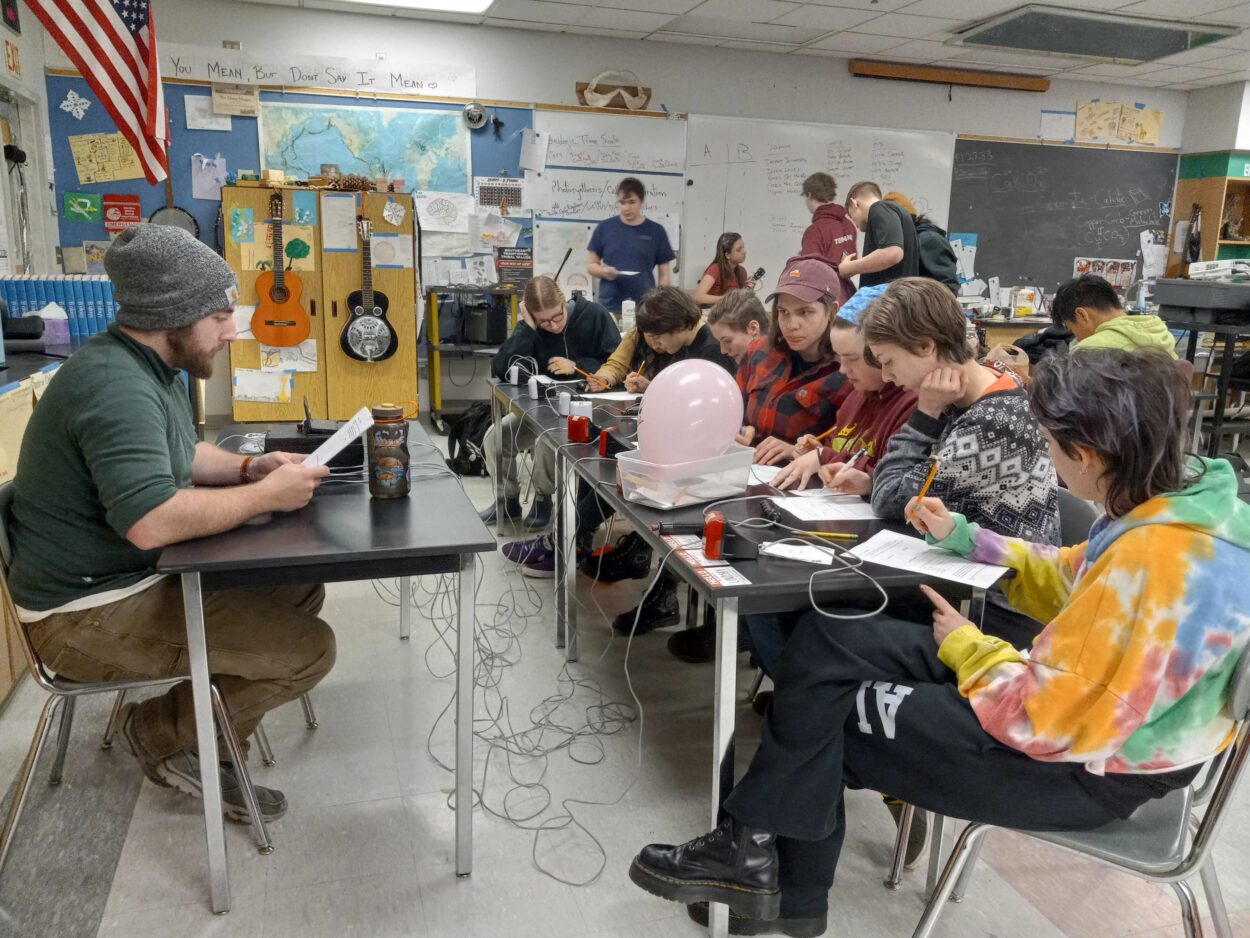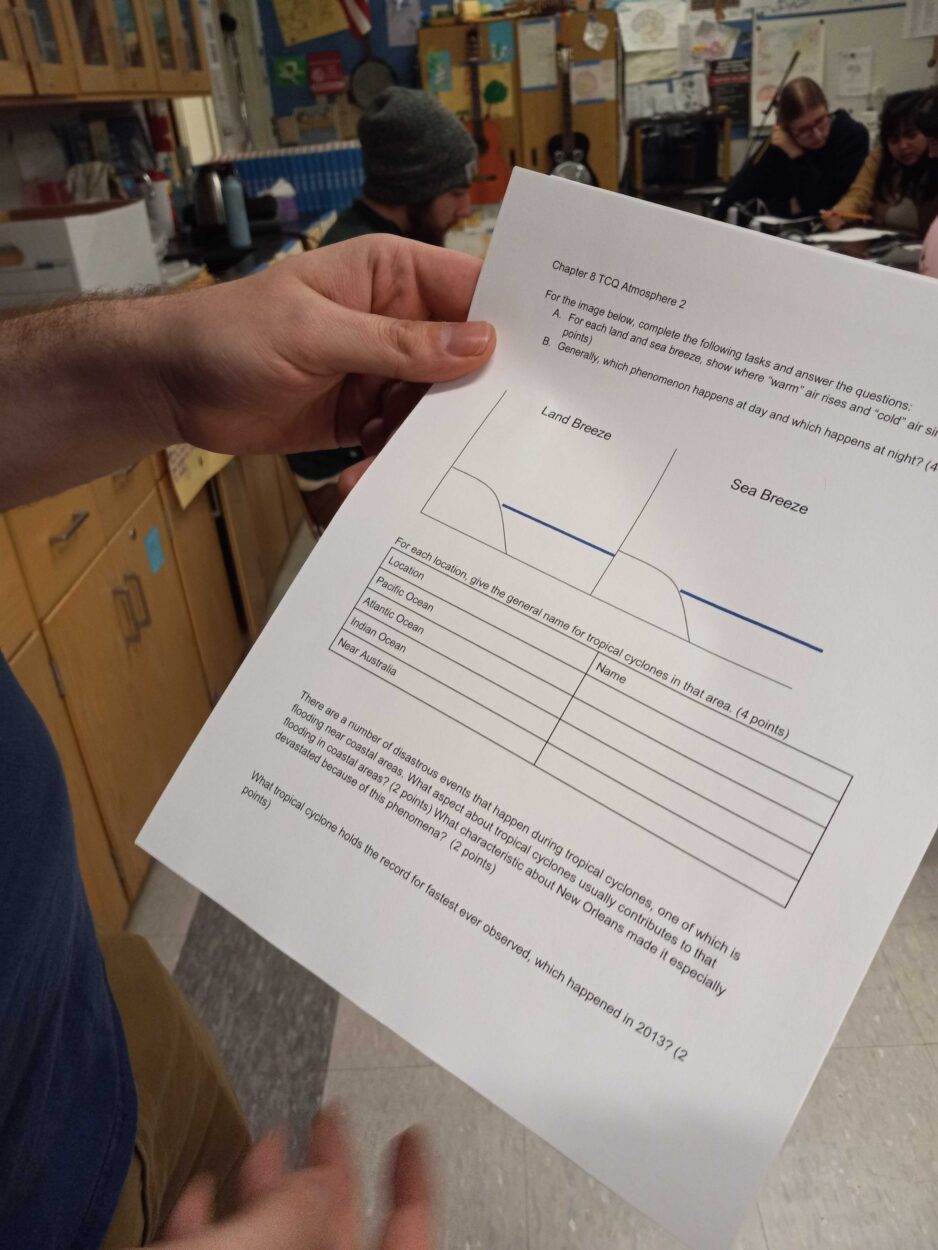
Ketchikan High School’s National Ocean Sciences Bowl team is two months away from heading to Seward for a state championship tournament. The program has gained so much traction in Ketchikan that there are now three squads to accommodate all the students who want to try it out.
“Why does the Intertropical Convergence Zone move back and forth over the equator?”
Keenan Sanderson, the head National Ocean Sciences Bowl coach, posed the question during a recent practice. The students used their game-show style buzzers to lock in their answers.
That’s a part of “quiz bowl” — a game show-style, timed round of questions that plays a big part in the National Ocean Sciences Bowl state competition in Seward. That’s where Ketchikan’s students are going this spring to try and bring home a state title in the marine science and oceanography program.
In preparation, the students have been working hard on practice competitions and putting the finishing touches on a 15-page research paper. Their paper and quiz bowl performance will determine where they rank among other schools in Alaska.

The program has grown rapidly over the past few years. In 2020, there were just six students. Now, there are about a dozen — enough to field three official Ketchikan teams. The senior-led Saber-Toothed Salmon are named for a now-extinct species of salmon that used to swim around Pacific Northwest waters with large, protruding teeth. They could weigh up to a ton and measure almost seven feet long. The two other teams are named for younger salmon: the Saber-Toothed Smolts and Saber-Toothed Fry.
Keenan Sanderson is the head coach. He explained the program lagged due to the pandemic, when there weren’t as many teams competing statewide, but it’s picking up speed again.
“Last year we had about 13, 14 teams compete around the state,” he said. “This year’s competition is going to have 11 teams from five different schools: three from Ketchikan, three from Juneau, two from Bartlett High School, two from Dimond High School, and one from Seward. It’s a relatively small field compared to … like when I was in high school, we had … I had 25 to 28 teams.”
This year, the teams are a mix of seasoned students and newcomers.
Romel Del Mundo is a member of the salmon team, and he’s been in the program for the last two years. He said it provides opportunities he doesn’t get in the classroom.
“I’ve been in a few other sports and stuff like that, but the one thing that is unique about this is just, I’m able to learn, and like just taking some information that, like, I wouldn’t even know about, like in school,” he said.
E. Posey, a junior, just joined the team a few weeks ago. Posey said an upbringing on one of the islands across the water from Ketchikan played a part in wanting to join the team.
“I usually go for geography — like, land based instead of ocean based, but I did grow up on Pennock (island), so the ocean is like a really important part of my life,” Posey said.
Posey said the program is unique because it’s a place where students from all different activities come together.
“It’s a very wide variety of people,” Posey said. “We have people from all different other types of sports and people who don’t have any other club affiliations and the schedule is really flexible.”
Sampson Oliver is yet another newcomer. He’s a wrestler, and when his teammates joined the program, he decided to give it a chance.
“They just pulled me into it,” Oliver explained. “And I (was) skeptical at first. Like I don’t really know what this is but like, after a few practices, just super fun. I’ve always been interested in marine bio, and I just always love, going out and fishing and diving, low tides and just finding stuff like that.”
Oliver said that late nights of rushing to finish their paper on time provided great team bonding experiences.
“But we definitely all work together,” he said. “And just got it done in a few days. But it was super fun. Like, we just stay at Kayhi to 10 o’clock at night, just all working.”
Izaak Landis is on the Saber-Toothed Salmon squad, made up of seniors. His team wrote a research paper about red king crab in response to a prompt asking about the potential benefits or drawbacks of increasing mariculture in Alaska.
“So this is the second paper I’ve written,” Landis said. “Ours is about red king crab mariculture this year, so we talked about using … facilities around Southeast Alaska or Alaska to make basically, like hatcheries like they do for salmon — except for red king crab.”
It’s a timely topic. State lawmakers passed a bill legalizing shellfish hatcheries last year.
The Saber-Toothed Smolt team wrote a paper examining the sea cucumber dive industry and potential ways to give it a boost in the coming years.
“In this paper, the students discuss alternatives to the existing dive fishery,” Sanderson wrote to KRBD. “The students found that there is high demand of cukes in the Asian market and it is something to be taken advantage of by resident Alaskans. Additionally, the students here say the supply issues during the coronavirus pandemic, and wanted to use this as an opportunity to make our community more food secure if a situation like that were to ever happen again.”
The Fry team was a new addition to the program this year, and didn’t write a paper — they’re focusing on quiz bowl.
The students say they’re looking forward to heading to Seward in March. That includes Tosh Ratzat, one of the Salmon team captains.
“I haven’t been in Seward for very long,” he said. “I would like to explore it a little bit — that’d be fun — and then also just like learning new stuff with quiz bowl is also super fun, too.”
Ratzat has high expectations for his team.
“I think that if we all put our minds to it, I think that we can do pretty good,” Ratzat said.
The students will start practicing their research presentations at school and in the community soon.
Members of the salmon team include Tiernan Johannsen, Izaak Landis, Romel Del Mundo, Mayumi Houser and Chezca Mae Correa. The smolts team features Tosh Ratzat, Kate Brown, Rickey Baum, Sampson Oliver and Paul Thompson. The fry team includes Carina Chernick, Kelvin Jiang, Gavin Harold and Leo Powell.
Raegan Miller is a Report for America corps member for KRBD. Your donation to match our RFA grant helps keep her writing stories like this one. Please consider making a tax-deductible contribution at KRBD.org/donate.





